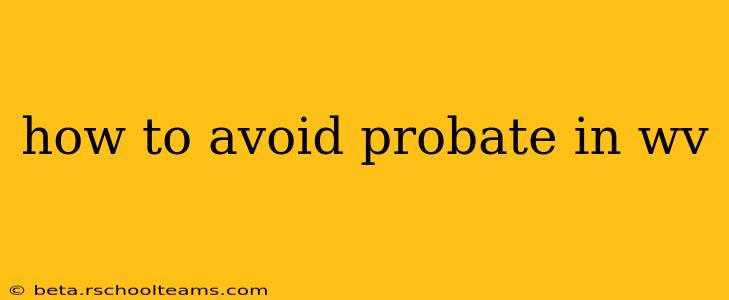Probate, the court-supervised process of administering a deceased person's estate, can be costly, time-consuming, and emotionally draining. Many West Virginians seek ways to avoid this process altogether. Fortunately, several strategies exist to bypass probate in WV, offering a smoother transition for loved ones after your passing. This guide explores these options and clarifies the circumstances under which they're most effective.
What is Probate in West Virginia?
Before diving into avoidance strategies, understanding what probate entails is crucial. In West Virginia, probate is the legal procedure where a court oversees the distribution of a deceased person's assets according to their will (or, if they died intestate, according to state law). This involves:
- Validating the will: The court verifies the will's authenticity and legality.
- Appointing an executor: The court appoints an executor (or personal representative) to manage the estate.
- Inventorying assets: All assets are identified and valued.
- Paying debts and taxes: Debts and taxes owed by the estate are settled.
- Distributing assets: Remaining assets are distributed to heirs according to the will or intestacy laws.
This process can be lengthy, particularly if the estate is complex, involving significant assets, multiple beneficiaries, or contested wills. Court costs and executor fees further add to the expense.
Common Ways to Avoid Probate in West Virginia
Several methods can help you avoid the probate process in West Virginia:
1. Transfer on Death (TOD) Deeds and Beneficiary Designations:
This is perhaps the most straightforward way to avoid probate for certain assets. A TOD deed designates a specific individual to inherit real estate upon your death, bypassing the probate court. Similarly, beneficiary designations on accounts like bank accounts, retirement accounts (IRAs, 401(k)s), and life insurance policies automatically transfer the assets to the designated beneficiary without probate intervention.
Important Considerations: While simple, TOD deeds and beneficiary designations only apply to specific assets. They don't address all your property.
2. Living Trusts:
A living trust, also known as an inter vivos trust, is a powerful tool for estate planning. You transfer your assets into a trust during your lifetime, naming yourself as the trustee (managing the assets). Upon your death, a successor trustee takes over and distributes the assets according to your instructions, avoiding probate. There are various types of trusts, each tailored to specific needs and circumstances. Seeking advice from a qualified estate planning attorney in West Virginia is strongly recommended to determine the best type of trust for your situation.
Important Considerations: Setting up a living trust requires legal expertise and careful planning. It's crucial to understand the responsibilities associated with managing the trust and to ensure all assets are properly transferred.
3. Payable on Death (POD) Accounts:
Similar to TOD deeds, POD accounts specify who receives the funds upon your death. This is commonly used for bank accounts and brokerage accounts. The designated beneficiary receives the assets directly, without the need for probate.
Important Considerations: Only applies to specific financial accounts.
4. Small Estates Affidavit:
West Virginia offers a "small estate" provision that allows for simplified administration of estates below a certain value threshold. If the value of the estate (excluding the family home) is less than a specified amount, an affidavit can be filed with the court, skipping the full probate process. The exact threshold changes periodically, so consulting the most recent West Virginia code is essential.
Important Considerations: This method only works for relatively small estates. The value of assets must be well below the specified limit.
Frequently Asked Questions (PAAs)
Here are some frequently asked questions about avoiding probate in West Virginia, often found in "People Also Ask" sections on search engines:
What is the best way to avoid probate in WV?
There's no single "best" way; the optimal approach depends on your individual circumstances, such as the size and type of your estate, your family situation, and your financial goals. Living trusts offer comprehensive estate planning, while TOD deeds and beneficiary designations are simpler for smaller estates. A West Virginia estate planning attorney can help you determine the most suitable strategy.
Can I avoid probate if I have a will?
Having a will is crucial for determining how your assets will be distributed, but it doesn't automatically avoid probate. A will is still processed through probate court unless other methods (like a living trust or TOD deeds) are employed.
How much does it cost to avoid probate in WV?
The cost of avoiding probate varies. Setting up a living trust involves legal fees. However, avoiding probate often saves money in the long run by preventing court costs and executor fees.
What are the disadvantages of avoiding probate?
While avoiding probate simplifies the process, it isn't without potential drawbacks. Living trusts, for example, require careful management and may involve ongoing administrative costs. It’s critical to weigh the pros and cons with professional legal advice.
Do I need a lawyer to avoid probate in WV?
While not always strictly required, seeking legal counsel from a qualified West Virginia estate planning attorney is highly recommended. They can guide you through the complexities of estate planning, ensuring you choose the most appropriate method for your specific situation and that all necessary legal requirements are met.
This information is for general guidance only and does not constitute legal advice. Consult with a qualified West Virginia estate planning attorney for personalized advice tailored to your circumstances. They can provide you with specific recommendations and help you navigate the legal complexities of estate planning.
